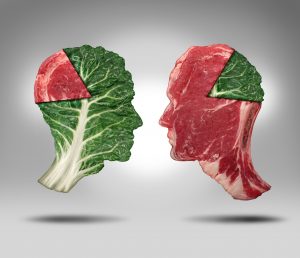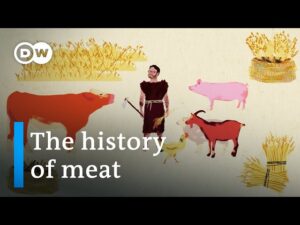Raboyseyee and Ladies,
Lusting for Meat
Let’s begin with this: Most Yiddin don’t crave salad, quinoa, or tofu. Man and especially Yiddin, craves steak; always has, always will.
And with that introduction, let’s begin here: The heylige Ois and eishes chayil have just returned from a one-week cruise to Alaska which featured beautiful scenery, glaciers, at least one whale, bald eagles — the RBSO’s creations on full display.

But let’s not get distracted: the real miracle was the buffet. It featured freshly cooked cuisine and plenty of it. Healthy salad ingredients, along with an array of ready-made salads were available daily, along with a great variety of other food choices. So happens that the menu -three melas daily plus tea room- included two meat meals. Why both lunch and dinner featured meat dishes, ver veyst, but this overabundance of meat got me thinking about man’s insatiable desire for a good shtikel meat; fleishfest!
Were there lines around the salad offerings? No and not once! Ober the lines for the carving stations, and the hot offerings were constant and on certain nights, long. The bottom line: With the exception of a few vegetarians and the occasional vegan, Yiddin are carnivores. Why is that? Ver veyst? Ober, did Jewish life always feature meat offerings? And who were the first Vegans? When did meat become the fashion that never went away? And what has all this got to do this week’s parsha?

Shoin, according to our wise sages (Chazal, Sanhedrin 59b, Rashi Bereishis 1:29), Adam (Odom HoRishon) and all mankind were originally forbidden from eating meat. The diet in those early days was limited to fruits, veggies, grains, and nuts. Mamish garden-to-table, the first ever. And we know this because the heylige Toirah very explicitly tells us this:
“הִנֵּה נָתַתִּי לָכֶם אֶת כָּל־עֵשֶׂב… וְאֶת כָּל־הָעֵץ” — all plants and trees; no burgers, no schnitzel. Strictly vegetarian. Though he lived a full 930 years, sadly, Odom never made it to the first “fleishig kiddush.”

Post Mabul, the RBSO made a new bris (covenant) with Noiach and his descendants (Bereishis 9:3):
“כָּל רֶמֶשׂ… לָכֶם יִהְיֶה לְאָכְלָה.”
Translation: Steak was now on the menu. Humanity was allowed meat for the first time. But! With conditions: No eating blood, and no eyver min hachai (limb from a living animal). In other words: no caveman cruelty, no vampire lifestyles. The bottom line: Noiach survived, stepped out of the teivah, planted a vineyard, got himself schnockered, and suffered what can only be described as one of the strangest and most humiliating incidents in the heylige Toirah (see Bereishis 9, Rashi, and the meforshim who can’t agree whether it was rape, castration, or both). The RBSO -efsher feeling bad about Noiach’s degradation and pain, gifted him the first heter to eat meat. Did Noiach make the first ever sium? Perhaps he thought he should celebrate his survival (of the mabul and the sexual assault) by making kiddish on a good piece of meat? The first ever seudas mitzvah? The meal wasn’t catered, no shmorg, but he did chap a piece of bosor and wash it down with wine. The bottom line: We are introduced to the concept of bosor (meat) as human food though Noiach in what we might consider a post-Mabul concession to human frailty. Man craved meat! Can we kler that’s the reasoning why whenever a Yid makes a siyum, it’s got to be on a fleishig menu? The bottom line: If it was good enough for Noiach’s siyum, it’s good enough for your nine-day sham siyum. Shoin, that topic too for another time.
Let us fast forward to a time a few hundred years later, when the Yiddin came out of Mitzrayim and made their way into the midbar. At this point, the only way a Yid could eat meat was as part of a korban (Rashi to Vayikra 17:3–5, Gemora Chullin 16b). Were someone to crave meat, he had to bring a korban shelomim. Though the people were likely bored out their minds circling the midbar aimlessly for forty years, there were no random barbeques. Absent of partaking from the korban’s leftovers, man’s diet (ladies too) consisted of manna from heaven (munn), veggies, and efsher some herring and kichel on shabbis. And taka says the Ramban (Devorim 12:20) that this limitation kept meat elevated, linked strictly to Avoidas Hashem, and not just stomach filling. And that’s just how it was for the entire 40-year midbar stint until this week’s parsha which dates to the final days before entering the Promised Land.
Back in the year 2488, mamish days before the Yiddin were to enter the Land, the heylige Toirah weighed in with a statement about eating kosher meat. As an aside, back then, chicken was still on the parve menu where taka –according to many- it belongs, and will one day return. That for another day or maybe – space permitting, even later in this post.
Welcome to Parshas Re’ay where among the 55 mitzvis Moishe will either review or teach for the first time, we come across this amazing posik which is mamish so givaldig. Says the heylige Toirah (Devorim 12:20), azoy:
“When the Lord enlarges your territory, as He has promised you, and you say, ‘I shall eat some meat,’ for you have the urge to eat meat, you may eat meat whenever you wish.”
You hear this raboyseyee? The RBSO is great: He chapped that people would have certain desires, especially as they pertain to meat –seemingly of all varieties, if you chap- and gave permission. Based on this posik, it’s quite poshit: Want meat, desire meat? In the mood? Get some. The bottom line: These random desires for meat gave rise to a new term as we are formally introduced to the term ‘Bosor Ta’avah.’ What the hec is that you ask? Let us define it as it appears in our parsha: The heylige Toirah (Devorim 12:20–21), attributes this phrase to meat that a Yid eats just because he wants it — not as a korban, not for a mitzvah, but stam, because he has a taavah or teivo (desire) for meat. Once the Yiddin were spread out over the land, the RBSO permitted bosor ta’avah — plain old meat, shechted outside the Beis Hamikdash, eaten just because one had a craving. The RBSO -in His greatness- understood desires.
The bottom line: Bosor ta’avah represents a Toirah-sanctioned concession to human desire. The Torah recognizes that people crave meat. Denying it entirely wasn’t realistic long-term. The RBSO chapped man’s facilities and desires for meat and responded. “Shoin, eat — but do it with boundaries, with shechita, with kashrus. In other words: Elevate your ta’avah.”
Ober, what’s the big deal? What’s the big news in town about permission to eat meat? Didn’t we already know this? Didn’t the heylige Toirah, way back in Parshas Shemini, specifically delineate what’s kosher and not to eat? In fact, it did. We got very detailed information about which animals may be slaughtered, what fowl we may consume, which fish are considered suitable for us to eat, and, we even learned about the kosher grasshopper. So, what’s taka new here and why is this information being repeated?
Let’s get real: Despite what we learned in yeshiva – and those who read this column for the past 15 years- know very well that I bring this question up quite often: How does this new information conflate with a very famous teaching from our holy sages who tell us this: “אין בתורה מילה יתירה” — nothing in the heylige Toirah is extra or wasted. Not even one letter is extra. Why would the RBSO “waste ink” by telling us the same things again?
Some argue that in Shemini, the kosher laws were given in the Mishkan context — immediately following the deaths of Nodov and Avihu, while the nation was learning about holiness, tumah/tahara, and the sanctity of camp life. Ober, here in our parsha, Moishe is retelling them as part of his farewell speech, framing them for a people about to enter the Holy Land. Here the message is not just ritual, but identity and nationhood: “You are different from the goyim, and your eating habits prove it.” In Shemini, the focus was on spiritual purity and avoiding tumah. In Re’ay, the focus is hashkafa / nationhood — “.כי עם קדוש אתה לה’ אלקיך” Eating kosher becomes an act of showing loyalty and distinctiveness. As well, one can also argue that our parsha has new and different details; Shmini and Re’ay are not word-for-word repeats. Shemini lists kosher animals by giving signs (split hooves & chewing cud) while Re’ay reviews the signs and emphasizes the practical separation from non-Jews (“Don’t eat what they eat, even if it’s not inherently treif, like neveilos”).
The bottom line: The heylige Gemora (Eruvin 54b) says it best azoy: The heylige Toirah must be repeated to be absorbed. Moishe’s repetition in Re’ay is the paradigm; sometimes the RBSO Himself repeats, because Yiddin need reminders and especially so when it comes to food. Let’s be real: We may forget to daven Maariv, but remember exactly what’s in the cholent!
Another bottom line is azoy: Why does the Toirah repeat the kosher laws? Because, eating is a daily nisayon (challenge). The RBSO could’ve told us once, but He knew that by the time lunch rolled around, we’d forget. So, He tells us again, loud and clear: Stay away from tarfus. In the end, nothing defines us Yiddin more visibly than dietary choices. We keep Shabbis at home, ober as to kosher, we are to keep it in the office, on the plane, on the cruise ship, and at the kiddush club. We keep kosher even when others’ behaviors aren’t so kosher. Maybe that’s why the RBSO said it twice: Once to sanctify us, and once to make sure we don’t embarrass Him in public.
All that being said, to chap what is new in this week’s instructions, we must re-read the posik quoted above, but this time in Hebrew and let us zero in on one big beautiful bolded and enlarged word.
“כִּי־יַרְחִיב ה’ אֱלֹקֶיךָ אֶת־גְּבֻלְךָ… וְאָמַרְתָּ אֹכְלָה בָשָׂר כִּי תְאַוֶּה נַפְשְׁךָ לֶאֱכֹל בָּשָׂר — בְּכָל־אַוַּת נַפְשְׁךָ תֹּאכַל בָּשָׂר” (Devarim 12:20)
“When the Lord enlarges your territory, as He has promised you, and you say, ‘I shall eat some meat,’ for you have the urge to eat meat, you may eat meat whenever you wish.”
The bottom line: Enjoying a good piece of meat is nothing but an urge. The heylige Gemora (Chullin 16b) explains azoy: In the Midbar, the Yiddin could only eat meat from korbonis. They could partake from certain sacrificial meat. Once in the Land, the RBSO widened their menu. Why? Ver Veyst? You want steak just because you want steak? Enjoy it. But notice the word ta’avah. That word does not translate to hunger. Ta’avah means lust. Shoin, need I say more? Says the Sforno that this type of desire is called bosor ta’avah and is a concession to human weakness. Desire, if you chap, is part of life, but it must be koshered. The RBSO chapped that man has desires, case closed. The Sefrono chapped human behavior. Our wise sages (Chazal) knew this: Once you start chasing one ta’avah, others quickly follow. From brisket bosor to meat of a different variety, if you chap. Was the RBSO hoping that man’s desire for meat – his lust- would be satisfied by a good piece of steak? Is that why the laws of kosher are surrounded by warnings about avoidah zoro and immorality? Yikes!

Says the medrish (Tanchuma Shemini 7) that the RBSO gave us kosher to refine the Jew’s soul. Treif food deadens the neshama. The Sefer HaChinuch (Mitzvah 153) writes that people are influenced by what they eat; kosher makes you holy, treif drags you down. The bottom line: It’s no wonder the RBSO repeated Himself; He didn’t trust us to get it the first time. Was He wrong? Not!
Let’s be honest: bosor ta’avah is alive and well at every kiddish. Who’s hungry at 11:30 AM Shabbis morning? Nobody! But when kugel, cholent, and carving station appear, it’s bedlam mamish. Shmorgs today are bosor ta’avah on steroids. Says the heylige mishneh in Avos, azoy: “מרבה בשר מרבה רימה” — “The more meat, the more worms.” What that means, ver veyst?
And taka, says the Ramban that Bosor ta’avah = concession. Ideally one should be satisfied with korban meat, ober man is weak, full of lust, and an overpowering yetzer horo. What to do? The RBSO -who programmed man- said OKAY. You want more meat? Fine, but keep it kosher. Says the Sforno whom we quoted just above, azoy: The laws of kosher are the RBSO’s way of teaching self-control: You can have desires, but they need to be channeled through halacha. How has that worked out for man? Not so well. Man’s desires for meat -in many varieties, if you chap- is at times insatiable. Guess what? The RBSO understands that as well. Shoin, Choidesh Elul begins one week from Sunday. Yom Kippur is mamish around the corner.

The bottom lines: Ershtens (firstly), bosor ta’avah is basically the RBSO saying: “I know you Yiddin can’t live on manna, kugel, and herring forever. Here’s steak — but play by My rules.” Desire for meat is not stam hunger. The heylige Toirah knew what it was from the get-go; lust. Once the door is open to indulging one ta’avah, well, we all know where that road can lead. Is that taka why the heylige Toirah sandwiched this whole discussion between warnings about avoido zoro and immorality?
Ober where is it written that one can compare the desire for meat with other desires? Who said that just because one is craving steak that he has other desires? Shoin, it so happens that our wise sages (Chazal) use this very phraseology: They often use bosor as a euphemism for more intimate matters. Nu, the Toirah knew; today it’s the lamb chop, tomorrow it’s bosor of a different cut.
Says the medrish (Devorim Rabbah 4:4) this: “אין תאוה אלא בשר ואין תאוה אלא ערוה”—
In plain English: there’s no ta’avah like meat and no ta’avah like women. Case closed. The same yetzer that makes you drool at the butcher counter is the same yetzer that makes you look twice when you shouldn’t. and now you know.
Indeed, our sages made the connection between bosor ta’avah (desire for meat) and other kinds of lust or sexual desire, though it was usually in the form of a mashal rather than a direct equivalence. Let me lay it out, if you chap, carefully.
The message: Appetite is appetite — and if you don’t check it in one realm, it spills into others. The comparison isn’t only wordplay or word association where one says meat but means sex; it’s a moral teaching. Seemingly, according to many a medrish and other exegetes, lust for meat is symbolic of unchecked physical indulgence. The heylige Toirah allows meat, but warns: Don’t let desire control you. So too with sex: the act is not forbidden, but the ta’avah (craving) is dangerous if it overrides discipline. The bottom line: When the rabbis speak of craving meat, they are also invoking the broader concept of ta’avah (lust), often aligned with sexual craving. It’s not quite “I say meat, I mean sex” every time, only most of the time.
In our parsha, the term “Bosor Ta’avah” appears in 12:20–21: The Yiddin may eat meat “because your soul desires it” (בכל אֲוַת נפשך תֹאכַל בָּשָׂר). Our sages explain that this is desire-based eating, not mitzvah-based eating. The Sforno and Ramban comment: Man has natural cravings, and the heylige Toirah allows them within limits.
In the heylige Gemora (Chullin 16b and Rashi there), the permission for bosor ta’avah is -as mentioned above- a concession to human weakness. The same language (ta’avah) is used elsewhere by our sages for sexual desire. The heylige Gemora (Eruvin 54b) uses ta’avah to describe inclinations that need boundaries. The heylige Toirah uses similar language in Bereishis: Odom and Chava’s lust and subsequent consequences are framed as natural human desire (ta’avah). And in the medrish on kosher laws, (Tanchuma Shemini 7) we find this: kosher eating refines the neshama; eating treif is linked to moral degradation, which includes sexual immorality. The bottom line: Our sages linked the control of bosor ta’avah with control over other taavos. Later halachic works use bosor as a euphemism for sexual matters: The Shulchan Aruch, Even HaEzer and other Rishonim occasionally use phrases like “don’t follow your bosor” when discussing marital or illicit sexual desire. The connection is not that eating meat causes lust, but that the heylige Toirah uses the same framework: natural human desire must be channeled through halacha. The bottom line: Desire itself is not evil, but must be properly managed.
Gevaldig! The RBSO admits: Yiddin are weak. Give them mun, they’ll complain. Give them slav, they’ll want ribeye. And once they taste meat, other kinds of bosor ta’avah are never far behind, if you chap. It starts with an extra steak, but who knows where it ends?
The bottom line: the RBSO chapped all behavior; again, He programmed us. He allows the ta’avah, but channels it. You want steak? Fine — but it needs kosher shechita, no blood, no treif animals, an acceptable hasgocho, in a meat only establishment. You want other types of meat? Get married! Better yet, enlist in the army. In two weeks, the heylige Toirah will teach us that a soldier on the battlefield who has sudden desires may taka enjoy some shiksa meat to indulge his ta’avos? There too, the heylige Toirah sets up boundaries. In fact the heylige Gemora debates whether double dipping is allowed before marriage, but does not deny the soldiers lust to go unsatisfied. Meat is meat. The final bottom line: Desire itself isn’t evil; it just needs a hechsher.
A gittin Shabbis!
The Heylige Oisvorfer Ruv
Yitz Grossman
